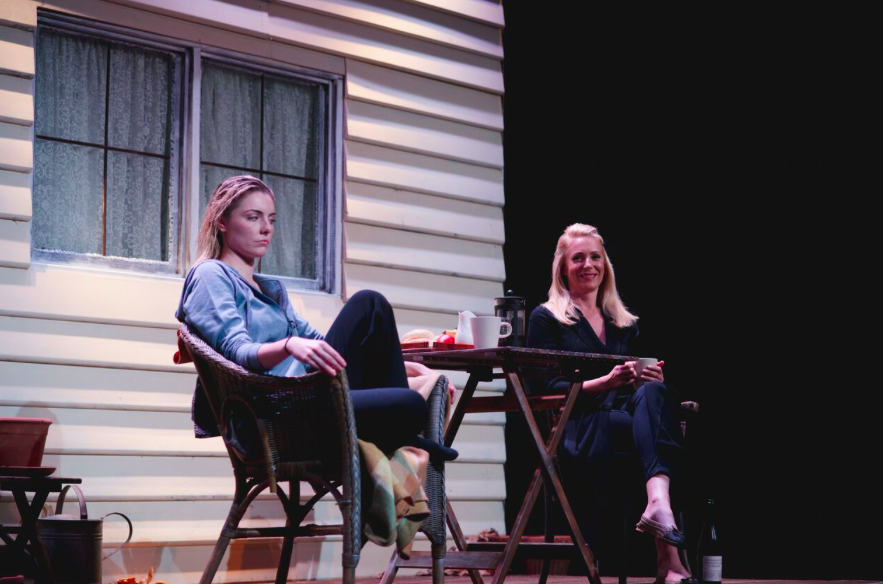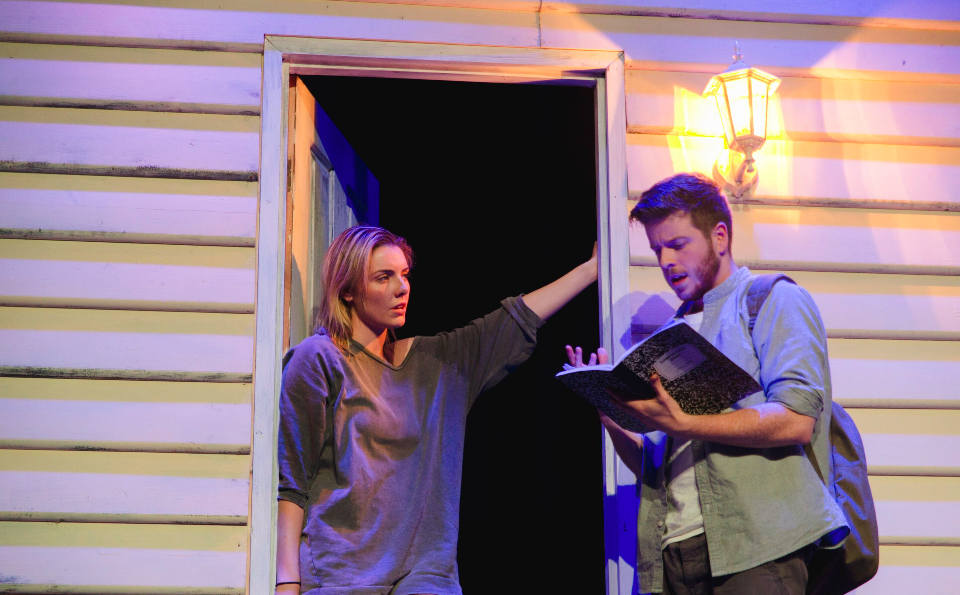★★★½☆ A dense text and technical foibles are overcome by superb acting in this company debut.
Alex Theatre, St. Kilda
June 9, 2016
Much like an advanced mathematical formula, David Auburn’s Pulitzer Prize-winning play, Proof, is at once intimidatingly dense and yet almost poetic in its elegance. In the vein of A Beautiful Mind or Good Will Hunting (both recent hits when Auburn penned this text in 2000), Proof stands the frailties of human emotion on the incompatible ground of intellectual genius, offering a relatable and touching story of grief, young love and sibling rivalry, anchored to the somewhat less accessible theme of mathematics.
We meet Catherine (Madeleine Jevic) on her 25th birthday. She and her father, Robert (Roy Barker) lock horns as she drinks the cheap Champagne knock-off he has bought her, straight from the bottle. It’s an age-old tussle: an exasperated parent desperately berating their offspring to make something of themselves, instead of sleeping till noon, wasting their precious youth; those years when their most exciting accomplishments may happen. Except this isn’t a typical conversation. Robert has been dead for a week, and Catherine’s precious youth has been squandered caring for him through a slow, desolating trudge into dementia. This prickly duel is nothing but a figment of Catherine’s bereaved mind.
 Madeleine Jevic and Anna Burgess
Madeleine Jevic and Anna Burgess
Being witness to her father’s mental decay would be tragic enough, but it is all the more devastating because, in his prime, Robert was the brightest mathematical mind in the world, revolutionising humanity’s understanding of the cosmos while barely into his twenties. His academic legacy has preserved his stature as one of history’s greatest thinkers, but the reality of his final decades was relentlessly bleak. Despite this, Hal (Mark Yeates), a young, awkwardly charming Ph.D. student and former pupil of Robert’s, is determined to discover a crumb of his former Professor’s brilliance scribbled in some forgotten notebook, possibly captured in a fleeting moment of lucidity.
Meanwhile, Catherine’s older and more settled sister Claire (Anna Burgess) has arrived from New York for the funeral. While Catherine has had the grim, hands-on reality of caring for her Father through his mental illness, Claire has been an absent party, although her job as a currency analyst has paid the bills for her sister and father for years. As Catherine struggles with a complex melee of emotions – resentment of her sister; romantic feelings for Hal; crushing sadness and furious regret for her father – her own substantial gifts with advanced equations and formulae consume her with one paralysing fear: has she inherited her father’s insanity as well as his genius?
This debut production by Artefact Theatre Co. is an impressive first outing, although a distracting lack of finesse in certain elements was a persistent reminder of the shoestring budgets grass-roots outfits like this have to work with. The lighting, set and (most problematically) the sound design were all extremely rudimentary, which isn’t necessarily a deal breaker – plenty of fine theatre is accomplished with the most meagre of resources. However, here the issues were more directly confrontational. Painfully clunky transitions with very little soundtrack to smooth them, inexplicably glitchy lighting cues and shake-rattle-and-roll staging placed a tangible strain on this production, stalling the dramatic momentum and fracturing the flow of the narrative as it leapfrogged from past to present.
That said however, there is much to praise about this show’s cast and director, Emily O’Brien-Brown. Auburn’s dialogue is unfussy to the point of mundane at times, and thus, it could all too easily feel humdrum without the chemistry, attention to detail and beautifully authentic subtleties this cast achieves. Each of these characters is realised with depth and sincerity, but also with restraint, resisting the temptation to cudgel some jarring hyperbole from the interactions. There’s a very welcome amount of naturalistic humour allowed to infuse throughout this production as well, largely found in the familiarity of the family dynamics (although there are a few maths-related gags too, if you like that sort of thing).
 Madeleine Jevic and Mark Yeates
Madeleine Jevic and Mark Yeates
Madeleine Jevic has crafted an extremely affecting account of Catherine, expertly navigating this role’s meandering course through defiance, passive aggression, desperation, thawing affection, and quiet optimism. There’s a moment when she confides: “What if I’m like dad?” Her face buckles with the terrifying reality of that fate, communicating an extraordinary amount of heartbreak and vulnerability in just a few seconds of silence. Her cautious, blossoming romance with Mark Yeates’s Hal is especially wonderful, executed with the perfect balance of faux-casualness and clumsy, hopeful enthusiasm. It’s a relationship you’re willing to succeed, even when it comes off the rails.
It may be a prize-winning play, but at times, Auburn’s text seems to misfire. It grazes some big questions, such as the gender disparity in academia, the tragic symbiosis of genius and madness, the corrosive power of depression, and the responsibility of talent, but it barely sticks more than a toe into these subjects which are fathoms deep. Nonetheless, the calibre of acting on offer here brings the most essentially human aspects to the fore in a way that masks many of this play’s shortcomings. In my opinion, it’s worth the ticket price for that reason alone.
Artefact Theatre Co. presents Proof, at the Alex Theatre, St. Kilda until June 19.











Comments
Log in to join the conversation.